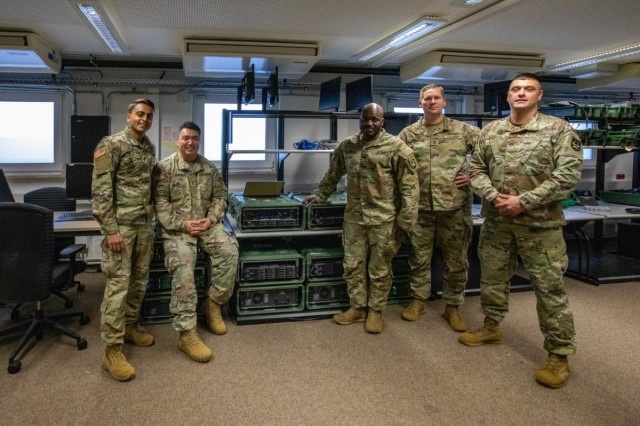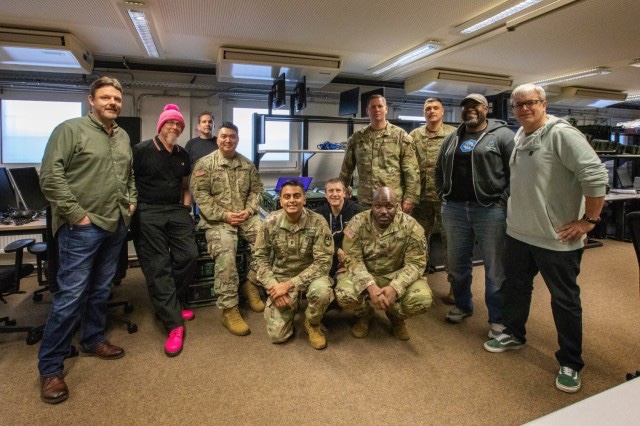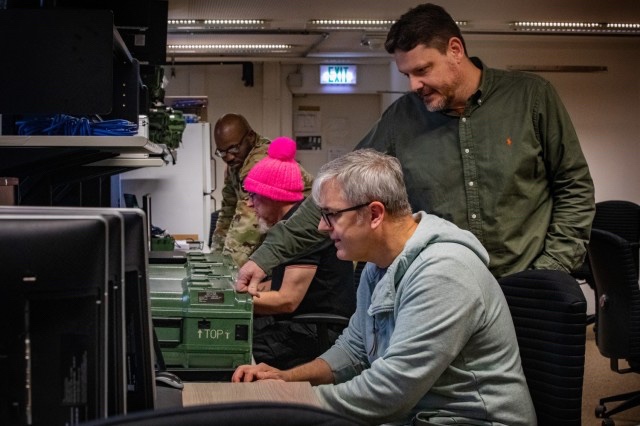
GRAFENWÖHR, Germany — In today’s rapidly evolving digital landscape, many organizations strive to stay ahead of the curve in terms of technology and innovation. The Department of the Army is no exception, and its efforts to modernize and streamline its operations have recently taken a leap forward due to the agile software development processes of the Army Software Factory, or ASF.
The ASF is a significant step forward in the modernization of military operations. By streamlining an agile software development cycle, minimizing the need for external acquisition and promoting collaboration, the ASF is positioned to deliver innovative solutions to the military.
“The idea here is that we’re trying to meet Soldiers where they are at,” said 1st Lt. Aanand Shah, a software engineer for ASF. “What that means here in Europe is we are able to develop solutions that can work across multiple networks with Allies, partner countries and nations as well as internally within theater.”

During a recent interoperability exercise at 7th Army Training Command the Soldier-led ASF, in collaboration with U.S. Army Europe and Africa Mission Command Support Branch, developed new solutions directly addressing issues that in the past created challenges for U.S. and NATO allied system interoperability.
“My developer initially wrote an application that would bridge data between U.S. and NATO systems from the Army Tactical Assault Kit,” said Martin Christian Dudel, a civilian senior software engineer with USAREUR-AF. “The Army Software Factory came to Europe and helped us modernize the code and take it from a standalone application that must run on a server, into a container that can operate in a cloud native environment on the tactical edge bridging U.S. and NATO systems. This is a capability that we didn’t have before.”
The solution opens an entirely new range of possibilities as now essentially any application can be developed, deployed and seamlessly interact with the data of a partner nation’s application operating at the tactical edge.
“We’ve developed a path to production where apps go from origin to security scanning to deployment into Kubernetes clusters that will run on a TSI stack here on the edge of the battlefield,” said Sgt. 1st Class Joshua Millett, a platform engineer with ASF.

At the heart of ASF is a commitment to continuous improvement and a focus on collaboration. Teams within the ASF are encouraged to work together and closely with their end users to cultivate user stories, share ideas, determine best practices and learn from each other. This helps foster a culture of innovation and ensures that everyone is working toward a common goal of delivering high-quality software solutions to meet the needs of the military.
“It’s incredibly rewarding for our Soldiers to assist USAREUR-AF in accomplishing its challenging mission while we help Army Futures Command design the Army of 2040,” said Col. Vito Errico, director of ASF. “The Army has exceptionally talented Soldiers who can help lead us through digital transformation at the lowest levels.”
Upon meeting with representatives from the 7th Army Training Command’s public affairs team, Col. Michael Kaloostian, a senior leader and decision maker with USAREUR-AF’s G-6 division, confirmed the ongoing collaboration and solutions from ASF’s efforts.
“Our relationship with the Army Software Factory is essential to the command’s digital transformation,” said Col. Kaloostian. “The European theater’s digital landscape is complicated, and it’s our responsibility to simplify it by innovating software-based solutions that are shareable with our mission partners at the speed of conflict. Incorporating a DevSecOps model into our cloud environment assures that we can rapidly meet the command’s operational priorities and truly become data-centric.”
One of 7th Army Training Command’s core missions is to lead the Army in developing Allied and partner nation interoperability by providing the Army with an active learning, near-peer environment to press modernization initiatives. Working with ASF to furnish a realistic operational training environment for U.S., NATO, Allied and partner nations to introduce solutions to the military’s modern challenges is one of the ways 7th ATC works toward accomplishing that mission.
Story by CPT Darryl Padgett
Photos by SSG Ashley Low

